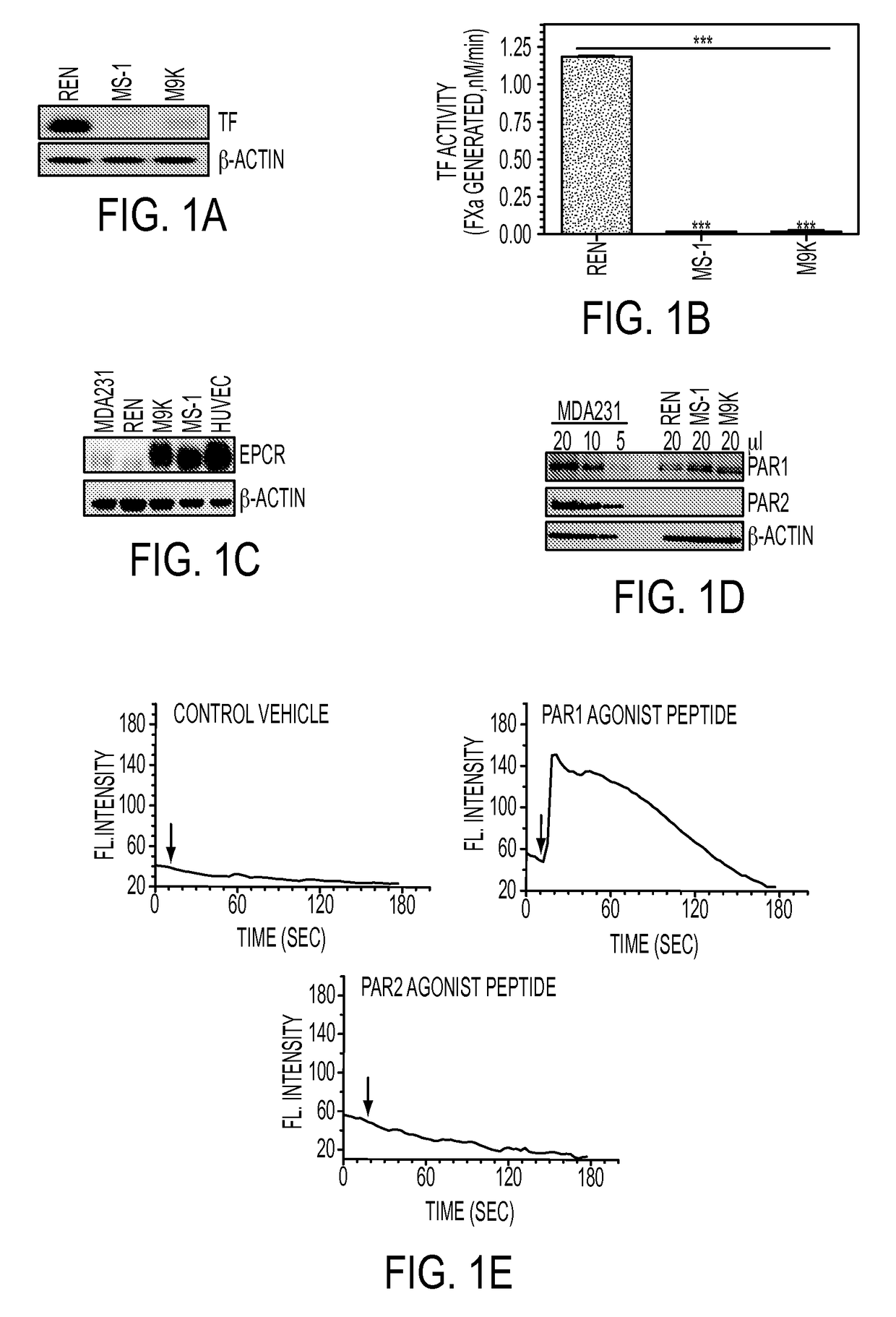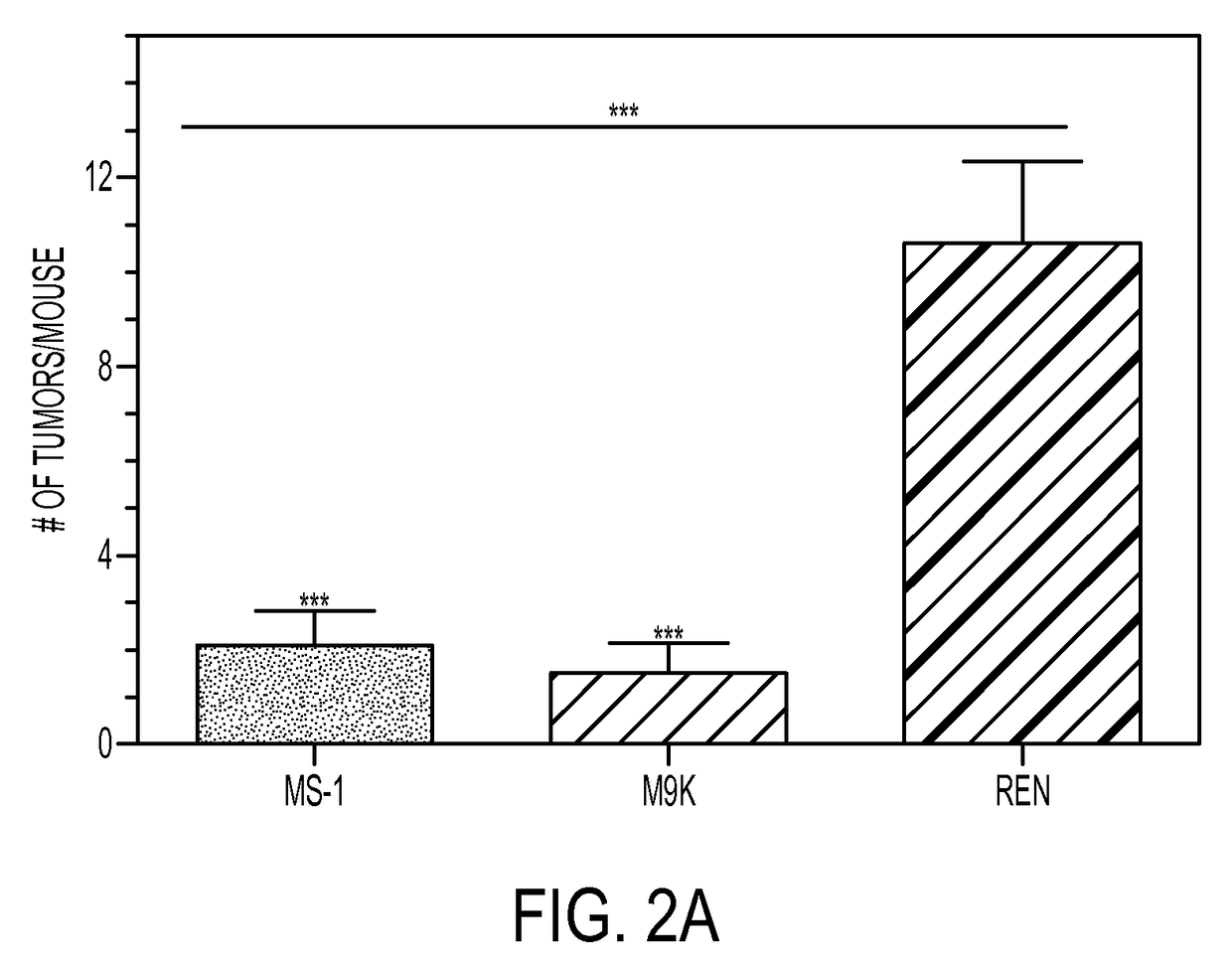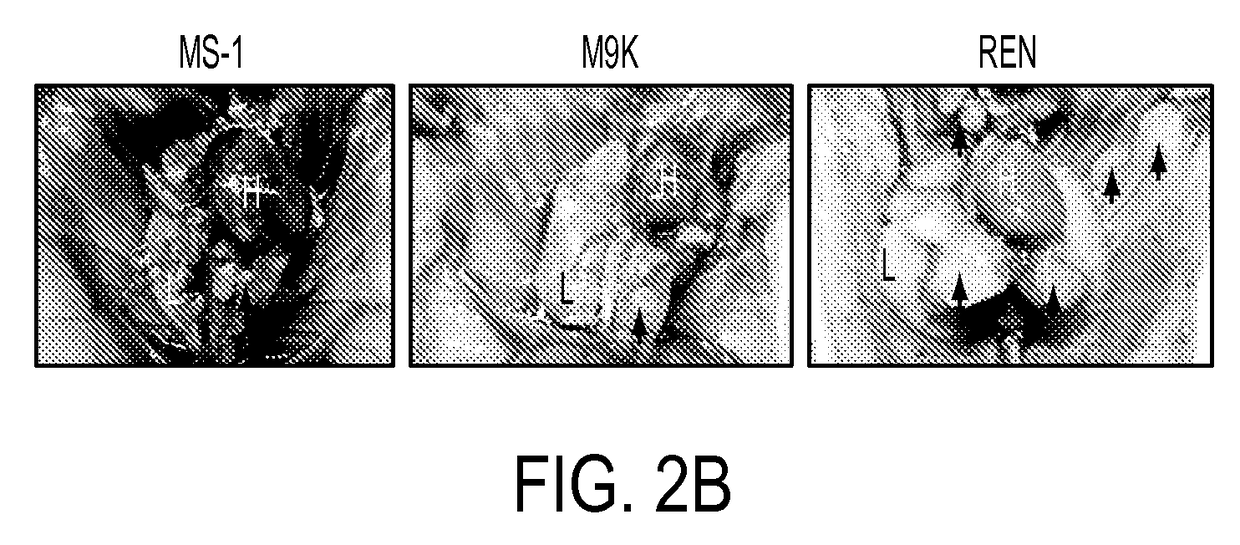Suppression of malignant mesothelioma by overexpression or stimulation of endothelial protein C receptors (EPCR)
a technology of endothelial protein and c receptor, which is applied in the field of biochemistry, molecular biology and medicine, can solve the problems of failure to induce an aggressive phenotype, achieve the effects of reducing tumor growth, attenuating tumorigenicity, and reducing tumor growth
- Summary
- Abstract
- Description
- Claims
- Application Information
AI Technical Summary
Benefits of technology
Problems solved by technology
Method used
Image
Examples
example i
Materials and Methods
Cell Lines and Reagents
[0201]REN cells were from S. Albelda, University of Pennsylvania, MS-1 cells were from S-M. Hsu, University of Texas Health Science Center at Houston, and M9K cells were from Dr. B. Gerwin, NIH. All cells were grown in RPMI medium+10% fetal bovine serum and 1% penicillin / streptomycin. Preparation of monospecific polyclonal anti-human TF IgG was described earlier (32). EPCR antibodies were obtained from C. T. Esmon, Oklahoma Medical Research Foundation. PAR1 and PAR2 antibodies were from Santa Cruz Biotechnology (Santa Cruz, Calif.). PAR1 and PAR2 agonist peptides were from Biosynthesis, Lewisville, Tex. Recombinant human FVIIa was obtained from Novo Nordisk (Maaloev, Denmark). Factor X was obtained from Enzyme Research Laboratories (South Bend, Ind.).
Generation of Stable Transfectants of MPM Cells Expressing / Lacking TF, EPCR or PAR1
[0202]TF or PAR1 expression in REN MPM cells was selectively knocked-down by shRNA. shRNA clones were generat...
example ii
Status of TF, EPCR, PAR1 and PAR2 Expression Levels in MPM Cells
[0211]The expression levels of TF, EPCR, PAR1 and PAR2 in REN, MS-1 and M9K MPM cells were analyzed by Western blot and functional analyses. TF expression was markedly higher in REN MPM cells compared to MS-1 and M9K MPM cells (FIGS. 1A and B). TF expression was barely detectable in MS-1 and M9K cells. In contrast to TF expression, REN MPM cells express very little EPCR whereas both MS-1 and M9K cells abundantly express EPCR, at levels found in endothelial cells (FIG. 1C). Western blot analysis revealed that all three MPM cell types express PAR1 whereas PAR2 expression was undetectable (FIG. 1D). Consistent with the antigen results, a PAR1 but not PAR2 agonist peptide induced intracellular Ca2+ release in REN MPM cells (FIG. 1E). A similar pattern of Ca2+ release was observed in MS-1 and M9K MPM cells in response to PAR1 or PAR2 agonist peptides (results not shown).
example iii
REN MPM Cells Generate Large Invasive Tumors and Knock-Down of TF Reduces Tumorigenicity of REN Cells
[0212]As reported previously, implantation of REN MPM cells into the thoracic cavity of nude mice resulted in multiple large tumors (>2 mm) within the thoracic cavity (FIG. 2A). The number of tumors in each mouse varied from 6 to 18. Some of the tumors approximated the size of the heart (FIG. 2B). All tumors were limited to the thoracic cavity. These tumors were highly invasive and often penetrated deep into intercostal tissues on which they were attached (FIGS. 2C and 2D). There was no evidence for metastasis as we found no tumors in distant organs such as liver. A variable number of very small tumors (<2 mm) found in the thoracic cavity may reflect dispersed initial seeding of tumor cells than pleural metastases. In contrast to REN, MS-1 and M9K cells in nude mice produced relatively few tumors and some of the mice developed no tumors at all. Most of the tumors that were generated ...
PUM
 Login to View More
Login to View More Abstract
Description
Claims
Application Information
 Login to View More
Login to View More - R&D
- Intellectual Property
- Life Sciences
- Materials
- Tech Scout
- Unparalleled Data Quality
- Higher Quality Content
- 60% Fewer Hallucinations
Browse by: Latest US Patents, China's latest patents, Technical Efficacy Thesaurus, Application Domain, Technology Topic, Popular Technical Reports.
© 2025 PatSnap. All rights reserved.Legal|Privacy policy|Modern Slavery Act Transparency Statement|Sitemap|About US| Contact US: help@patsnap.com



